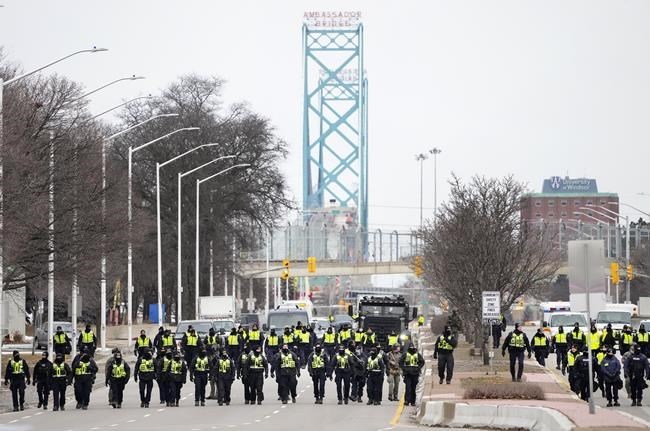OTTAWA — The federal government has set aside $6.9 million to cover the cost of dealing with last winter's "Freedom Convoy" protests at Canada's busiest border crossing, according to Public Safety Minister Marco Mendicino.
At a press conference on Thursday, Mendicino said the funds set aside by Ottawa will help pay cover the costs incurred by Windsor, Ont., though the actual amount the city will get is still under discussion.
Windsor had been calling for compensation since last winter, citing the high cost of business closures and restoring public order after hundreds of protesters opposed to COVID-19 mandates blockaded the Ambassador Bridge on Feb. 7.
Similar protests shut down border crossings in Saskatchewan, British Columbia and near the town of Coutts, Alta., while "Freedom Convoy" demonstrators blockaded streets near Parliament Hill for several weeks.
Windsor police launched a major operation to end the bridge blockade on Feb. 13, and the border crossing was reopened the next day. The city later asked the federal government in April for $5.7 million to cover the associated costs.
The Liberal government has said the blockade at the Ambassador Bridge, which is the busiest border crossing between Canada and the U.S., cost hundreds of millions of dollars in trade each day, particularly for the automotive industry.
Mendicino echoed that assessment on Thursday, saying the protesters jeopardized Canada's position as a reliable trading partner.
"They didn't just force auto plants to temporarily close," he said. "They made it harder for working families all over Ontario."
Mayor Drew Dilkens said everyone in the city "intuitively knows" a closure of the bridge has an impact on the community, which is why police launched such a large-scale operation without worrying about the cost.
"We all knew that this was an issue that had to be resolved and resolved in a timely way," he said.
The Ambassador Bridge blockade has figured prominently in the post-"Freedom Convoy" debate around Prime Minister Justin Trudeau's decision to invoke the Emergencies Act in February.
The Liberal government has cited the border closure as a key reason for declaring a public order emergency on Feb. 14, the same day the Ambassador Bridge reopened to traffic.
But a public inquiry heard this fall that the extraordinary powers granted to the government, police and banks under the act were not needed to end the Windsor protest, which police shut down after the city got a court to ban the demonstrations.
Inquiry commissioner Paul Rouleau is expected to deliver his final report in February.
Meanwhile, the city of Ottawa has also asked the federal government to cover the roughly $37 million in costs it incurred related to the downtown blockades. The Liberals have not announced a funding deal for the capital.
This report by The Canadian Press was first published Dec. 29, 2022.
David Fraser, The Canadian Press

